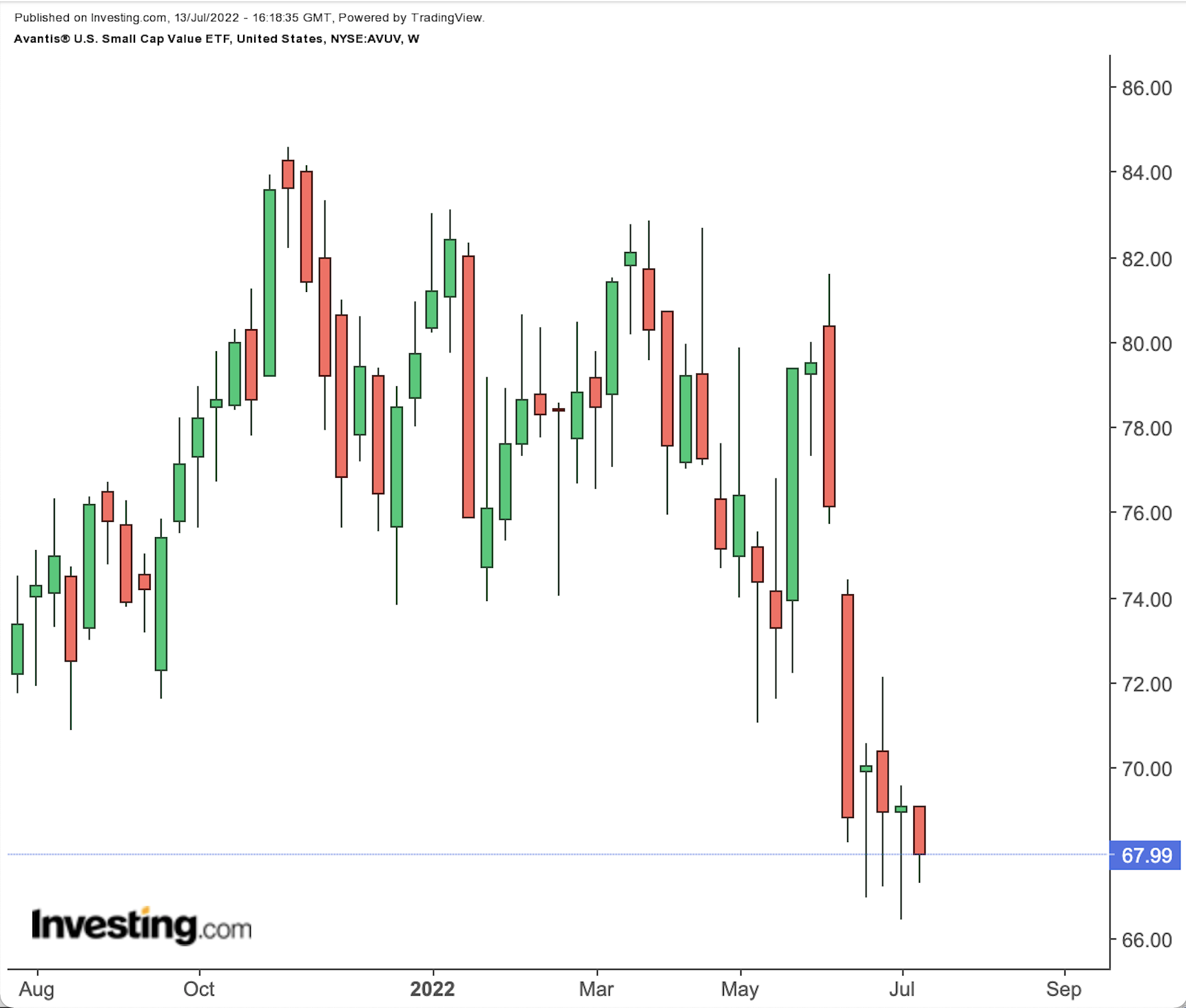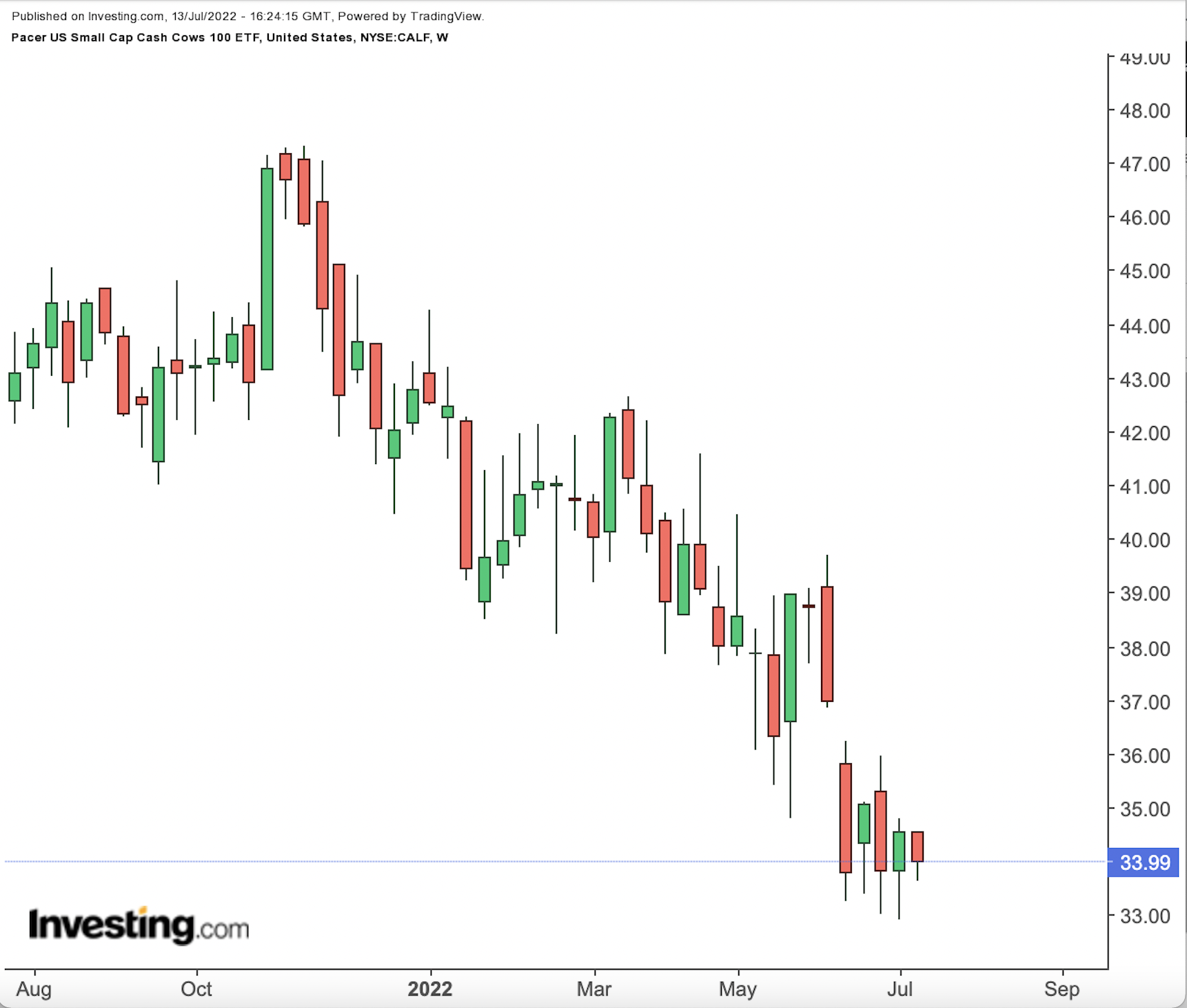- Investors are concerned about high inflation and aggressive rate hikes, even as they gear up for upcoming earnings
- While large and mid caps garner most of the attention during earnings season, small caps offer considerable upside potential
- ETFs that offer investors broad exposure to small-cap stocks
Wall Street is concerned about the latest Consumer Price data released on July 13, which saw inflation increase by 9.1% year-over-year. Numbers suggested “the increase was broad-based, with the indexes for gasoline, shelter and food being the largest contributors.”
Readers may remember that May’s reading of 8.6% was the largest increase in more than four decades. Now, most analysts concur the Federal Reserve will continue its aggressive rate hikes the rest of the year.
Meanwhile, investors are gearing up for new upcoming earnings. Despite the sell-off, earnings expectations on Wall Street have remained resilient across the board.
Large and mid caps typically get the most attention during the reporting season. However, seasoned investors also pay attention to small-cap companies, which typically range from $300 million to $2 billion. Many of them have fallen significantly and are beginning to offer value for the long run.
For instance, both the Russell 2000 Index and S&P 600 Small Cap plummeted around 25% since January. By comparison, the S&P 500 Index and the Dow Jones Industrial Average have dropped 22% and 16%, respectively.
Portfolio manager at Royce Investment Partners Chuck Royce and Co-CIO Francis Gannon see long-term value in small-cap stocks, saying:
“Small caps have averaged a 3% premium to large-caps over the past 20 years. At the end of June, however, small-caps were at a 20% discount, at their lowest relative valuation versus large-caps in more than 20 years.”
We also remain confident of the performance of small caps in the months ahead. Given their risk/reward profiles, most small caps underperform the broader market during declines. But when the tide turns positive, they tend to lead on the upside.
One of the best ways to take advantage of such growth would be to buy the dips of an exchange-traded fund (ETF) that offers broad exposure to small-cap stocks. Therefore, today’s article introduces two such funds. However, we should note that many small-cap ETFs include several mid-cap names as well.
1. Avantis U.S. Small Cap Value ETF
Current Price: $67.99
52-Week Range: $66.41 - $84.59
Dividend Yield: 1.91%
Expense Ratio: 0.25% per year
The Avantis® U.S. Small Cap Value ETF (NYSE:AVUV) is an actively managed fund that invests in U.S. small caps trading at low valuations and with relatively high profitability ratios. The fund was first listed in September 2019.

Source: Investing.com
AVUV, which follows the Russell 2000 Value Index, currently has 652 stocks. Financials have the largest slice with 30%. Next come industrials (16%), energy (15%), consumer discretionary (15%) and materials (7%).
The largest 10 holdings account for roughly 7.5% of $3.14 billion in net assets. Murphy USA (NYSE:MUSA), which operates gas stores; intermodal container leasing group Triton International (NYSE:TRTN); poultry producer and processor Sanderson Farms (NASDAQ:SAFM); logistics company Ryder System (NYSE:R); and building solutions provider Louisiana-Pacific (NYSE:LPX) are among the leading names on the roster.
AVUV saw an all-time high in November 2021. But the ETF is down more than 15% so far this year and hit a 52-week low on July 6. We like the diversity of the fund and believe long-term investors can find value at the current levels.
2. Pacer U.S. Small Cap Cash Cows 100 ETF
Current Price: $33.99
52-Week Range: $32.88 - $47.33
Dividend Yield: 3.30%
Expense Ratio: 0.59% per year
Wall Street loves companies with stable and large cash flows. Analysts concur that when rates rise and growth slows down, cash flow becomes even more valuable. Understandably, companies with large free cash flows can absorb increasing costs and navigate market downturns.
The Pacer U.S. Small Cap Cash Cows 100 ETF (NYSE:CALF) invests in the top 100 companies from the S&P SmallCap 600 Index with the highest free cash flow yields.

Source: Investing.com
CALF was first listed in June 2017. Its net assets stand at $844 million. More than 40% of the fund is in the consumer discretionary sector, followed by industrials (18.6%), information technology (10.3%), materials (7.6%) and health care (7.5%). We find about a fifth of the portfolio in the top 10 stocks.
Leading holdings include the commercial-stage immunology company Vir Biotechnology (NASDAQ:VIR); health-care staffing specialist AMN Healthcare Services (NYSE:AMN); Fulgent Genetics (NASDAQ:FLGT), which offers genetic testing; sporting goods and recreational retailer Academy Sports Outdoors (NASDAQ:ASO); and management consulting group Korn Ferry (NYSE:KFY).
CALF has declined 20.1% since January and hit a 52-week low on July 5. We believe the fund could find a place in long-term portfolios of those who pay attention to company cash flows.
Disclosure: Tezcan Gecgil, Ph.D., does not have any positions in the securities mentioned in this article.
Which stock should you buy in your very next trade?
With valuations skyrocketing in 2024, many investors are uneasy putting more money into stocks. Unsure where to invest next? Get access to our proven portfolios and discover high-potential opportunities.
In 2024 alone, ProPicks AI identified 2 stocks that surged over 150%, 4 additional stocks that leaped over 30%, and 3 more that climbed over 25%. That's an impressive track record.
With portfolios tailored for Dow stocks, S&P stocks, Tech stocks, and Mid Cap stocks, you can explore various wealth-building strategies.
